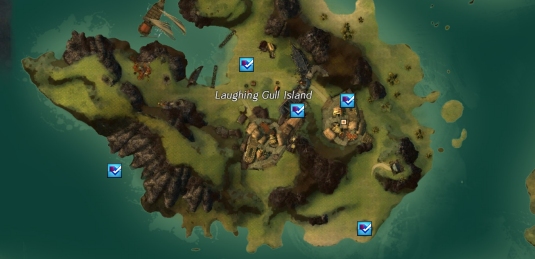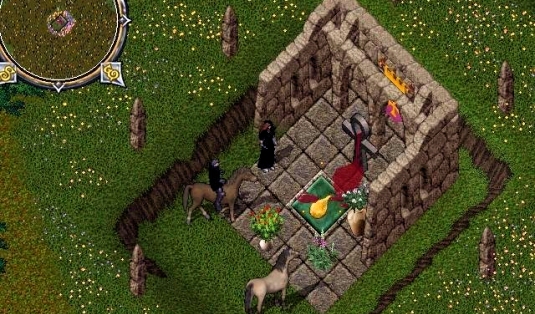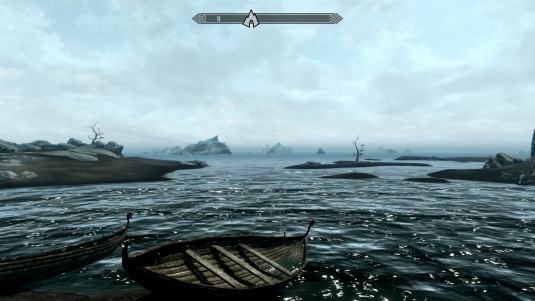
Beau Hindman, a Massively writer who is as zany as he is endearing, long ago penned an opinion piece titled The road (much) less traveled. In it, he argued that MMOs ought to give players strong, palpable reasons to travel and explore the amazing worlds we so often take for granted in our rush to what is so frequently a less gratifying endgame.
And yet unlike many so-called immersionists in other games (e.g., The Elder Scrolls series), he doesn’t advocate the destruction of every last convenience in a game. Let us have our minimaps and compasses and macros and swift travel, he says. Those who want to use them, can. Those who don’t, won’t.
I just want to cuddle this opinion and hug it to death. So many old-schoolers — in gaming as IRL — revel in defining themselves by how rough things were “back in the day,” especially as it pertains to exploring gameworlds. They walked to school five miles in the snow, uphill both ways, you know. Kids these days are soft. They have it so easy. Everything was better back when it sucked. Commenters on a recent EverQuest-flavored Massively article illustrate this beautifully:
- Poster #1: Can you imagine what most ‘modern-day’ gamers would think of waiting 20 minutes for a boat ride between continents, sitting 10 minutes between combats so [they] could regenerate mana or health, permanently losing their gear when their corpse decayed, or losing a level?! (Especially when you lost it in a zone that had a minimum level to enter, like the Plane of Fear, and you couldn’t re-enter the zone to claim your corpse.)
- Poster #2: You’re implying modern day gamers think at all.
- Poster #3: 1999-2001 were nothing short of amazing times!
- Poster #4: I love EQ as much as most, and played it from release until WoW (and back into it again now), but if there were two versions of EQ out back in 1999-2001, and in the alternate version you medded up quickly, didn’t wait 20 minutes for a boat, lose xp on death, or permanently lost armor in corpse decays, I’d be beyond shocked if the vast majority of players didn’t flock to the alternate version.
- Poster #5: The games aren’t evolving; they’re devolving into skinner boxes that are designed to satisfy simple minds whose ideal game session is logging in, doing a menial task that requries no effort or thought and has no punishment for failure, and coming away with phat loots.
- Poster #6: I love all the hipsters who pine for the pre-NGE SWG days, forgetting how we had to sit in a cantina for an unknown amount of time watching a dude dance his Twi’lek female character to heal our mind wounds. Today’s gamers have no patience for time investments or loss. If they did, EVE would not have only just barely achieved Ultima Online subscriber numbers 10 years in.
I acknowledge those early days were rough. I acknowledge that it took a special sort of person to slog through them — namely, people like me who were in college back then and could skip class (or in my case, sleep) to put in the hours required to achieve anything in founding MMOs like Ultima Online and especially EverQuest. I don’t like this war between the generations, though. I don’t think we should let nostalgia blind us to what sucked about olden times any more than we should forget about what made those days so extraordinary. And I won’t accept that it’s some great tragedy that the genre has bloomed from under 500k players total to millions and millions and more.
Mind you, I don’t think that all old-schoolers are curmudgeon gamers. Some old things are worth keeping alive; you know I love me some sandbox housing and crafting. But when you tell me that “sitting on the ground as you stared into a spell book for several minutes regenerating mana” was a wondrous gameplay mechanic, I call bullshit because I was there and it sucked. When you tell me that forced grouping and open-world instances created intense and unique communities unheard of today, I say nope because I was there and the communities were still filled with pricks then just as now. And when you tell me that being forced to walk on foot across the entire continent just to get a dungeon was the pinnacle of MMO exploration, I say no way because I was there and… sorry what was that? I just fell asleep from boredom auto-running across Antonica.
You’re not a better gamer for having lived through that garbage except in that it should have made you stronger and wiser and more capable of distinguishing good gameplay from bad. I wouldn’t wish those terrible EverQuest design choices on anyone, not even those darn kids on my lawn. Those mechanics sucked then and they sucked now, and they’re among the reasons my guild, one among many, fled Norrath the instant Camelot and then SWG opened their gates.

But EverQuest wasn’t the only game in town even before that. The game I’ve spent the most time just purely exploring is Ultima Online, both in its heyday before the turn of the century and later still after the game began its decline. It’s not the most beautiful world by far. It’s dated. It looks old. It’s isometric and cheesy. I know that when I look at it, I am at least somewhat impaired by nostalgia (my nostalgializer says I should get someone to drive me home, anyway). Younger gamers will never view it the way I do because not only does it look like something designed before they were born, but it’s devoid of meaning and emotion and experience for them.
There are very good self-motivating reasons to explore in UO, not the least of which is housing. On crowded servers, housing plots are in high demand. Even when accounts are restricted to just one house across all servers, there aren’t enough larger plots to go around. As I’ve discussed on this blog before, house-hunters (or hopeful-looters) will spend weeks roaming over every corner of the shard, scouting out land and decaying homes. Powerful adventurers will spend a lot of time in the lands of Ilshenar, which randomly spawns paragon monsters with valuable loot. The game also boasts a treasure hunting system, a revamped boating system, and a fishing system through which you can explore and loot sunken ships for lost treasures and sea monsters.
And in spite of all of that, Ultima Online actually has one of the most player-friendly and convenient travel systems in any game since. No one would call it hardcore. In WoW, I’d have to visit a destination once before being able to hop a griffon there, and griffons can take many minutes while I wander AFK. In Guild Wars, I can travel instantly, but I still must have unlocked a location through questing or by getting another player to speed-run me. Even City of Heroes required me to find the nearest train station to hitch a ride to my zone of choice.
But in Ultima Online, I can port almost anywhere, instantly, using just a few spells: Mark, Recall, Gate, and Sacred Journey (the Paladin’s version of Recall). Players can use the Mark spell to lock a specific location to a rune. That rune can be used an infinite number of times and conveniently stored in a player-crafted rune book that holds 16 such runes, each to a different location. A single character can carry dozens of these rune books, making travel throughout the world instant, painless, and repeatable. It’s the kind of easy travel system that angry old-schoolers would say is “ruining MMOs” if it weren’t, you know, in the seminal game of the genre.
The curious thing about Ultima Online is that the ease of travel actually made me want to travel and explore more, not less. Instead of cheapening the experience of travel or making the world map feel small and accessible, the spells gave me a sense of ownership over the map, that feeling that I could hop to anywhere at any time and back again if I had to log out in a hurry (a typical barrier to deep-dive exploration trips). Somehow, the ability to go anywhere gave me the freedom and motivation to do precisely that. I once went on a pilgrimage to all the shrines. I sailed my boat around the world (literally, since the map wraps around). I built my own rune library (several of them over the years) for my friends and customers, and in doing so, I explored every inch of the game (more of it as a ghost than I might have liked).
So much for the idea that instant travel ruins the game and that slow travel is necessary for a rich MMORPG experience!
Exploration has become the new buzz-word in the last half-year. Maybe it’s the new “MMO story.” EVE Online, for example, is promoting its summer expansion Odyssey as an explorer’s paradise. WildStar, due out later this year, has an entire Explorer path and special exploration-oriented content for people who choose it, like the ability to enter secret underground tunnels that speed travel across zones.
But we’ve also seen how exploration-as-formal-game-mechanic can go awry. As much as I love wandering around Tyria, Guild Wars 2’s exploration mechanics aren’t designed for classic explorers at all. They’re set up for puzzle-junkies and achievers. Exploration in GW2 is a set of achievements, complete with X-marks-the-spot waypoints, points of interest, and vistas. It’s beautifully done and I enjoy it, but I’m just not fooled into thinking I’m exploring anything. I’m touring. I’m running to the next spot marked on my map and checking in on Foursquare.

The Elder Scrolls Online is pissing off the old-school curmudgeons too. Said one Massively reader upon learning that ESO will have a compass with waypoints similar to the one found in Oblivion and Skyrim, “Oh man, that sounds like some exciting exploration. I can’t wait to find the exclamation points that the magic grocery list compass points me to.” I won’t say it fills my heart with joy; it sounds like another brochure-led romp through a tawdry tourist trap in an era when what we really need is more self-motivation and personal investment. But I won’t go so far as to join the anti-compass brigades who fill up the official forums with mods to neuter cartography while whining about how kids these days can’t read maps and ZeniMax is obviously catering to 10-year-olds (which is funny because the average 10-year-old can probably work the hell out of a smartphone navigation, which is already more tech skill than I had at their age).
The more time we waste fighting these generational wars, the more we get bogged down in these cum hoc ergo propter hoc arguments and the more we lose sight of the real goal: a more persistent, more explorable, more profound gameworld to live in. EverQuest doesn’t have that nostalgic pull because of its terrible mechanics; correlation is not causation. EQ’s travel sucked, but the world beyond the mechanic was worth exploring. Ultima Online’s travel was no great challenge either, but the world beyond griefers and recall scrolls was worth exploring. The Elder Scrolls’ worlds are worth a leisurely meander with or without a compass, and Guild Wars 2’s world is a treat even once your suspension of disbelief is shattered. I want to see more games with big worlds whose every corner is worth the trek because if there’s a shit sandwich at the end of the journey, then the mechanics of that journey, however conducive or hostile to exploration, were wasted.
When we’re begging developers to recapture the magic of classic MMORPGs, we’re at least in part asking for reasons to explore — not waypoints we can check off, not achievement badges to sew on our scout sashes, and not a lame Hard Rock Cafe t-shirt to prove we were there. That doesn’t mean devs must make their world hard to access to make it worth our voyage. They just have to make the world breathtaking and sumptuous and brimming with destinations that are their own reward.
No pressure or anything.
I guess it’s the issue of risk/effort vs. reward. In MMOs it’s hard to find a good compromise without the aid of instancing and difficulty selection. Making something more accessible sort of goes against the idea of higher effort – higher reward; at least games have been struggling to devise ways how to reward greater effort while keeping low barrier of entry. I really liked the DDO’s approach to selective difficulty but with open world content it’s a lot trickier.
As much as I hate to admit it, character and mood have a huge influence on any kind of experience we have. If I’m grumpy I can’t enjoy anything and vice versa. If a game has detailed character-building I get annoyed when builds with interesting playstyle are overshadowed by a few well-known “overpowered” builds. Even though I liked Neverwinter Nights the game required years of community balancing and it wasn’t fun to have people around me who had it easier just because they chose to play a cleric. As a side note, I have a beef with spell casters in fantasy games similar to how people look at jedi in Star Wars games. For the sake of the gameplay classes usually have to be equally strong and equally available despite lore or logic.
Getting back to your point, I’m not sure it’s easy to lower the barrier of entry without making the greater effort less satisfying, at least via the game mechanics. You’re probably talking about the emotional reward from exploration which is very difficult achieve, sell to the publisher and advertise to the gamers. I’d compare it to a game or a film with great plot but very limited potential how to advertise it without spoilers. So my interpretation is that it’s easier to sell features rather than experiences. Of course I too hope to see rewarding MMOs without relying on in-game rewards, just that when I see games like Spec Ops: The Line not selling enough copies while people can’t stop raving about Crysis 3 it makes me angry and sceptical. By the way, shooter or not, you should definitely play Spec Ops: The Line. It’s short, engaging, thought-provoking and quite cheap to boot.
PS: Even though you don’t blog that often I’m glad I can get a dose of brants on the Massively Speaking podcast
As a brit i’m draw parrellels with the “miners” scetch performed by monty python when i read many of massively’s comments that reiterate the sentiments mentioned above. The “good old days” of mmo’s are often a painful memory for me and think those people want new people to suffer these backbreaking (lack of) features prior to them being invented by MMO companies. Is progression really that wrong? Should they just take the subs and never develop?
I’m curious on your views on wildstar’s explorer which seems to have made a career out of GW2’s jumping puzzle achievement tab comparing that to Miasmata where you actually use triangulation to “map” the island. Yet wildstar is being praised as the second coming…
comparing that to Miasmata where you actually use triangulation to “map” the island. Yet wildstar is being praised as the second coming…
Your “We drop stuff” group and your tele-scripts sound much more fun than that…
I haven’t personally played the explorer path yet, but from what I’ve read and seen, you’ve summed it up pretty well — at least part of it revolves around jumping puzzles. (There is also a bit where the explorers have access to underground tunnel systems with swift travel and special vendors and mobs, though, which looks SO COOL.)
Thing is, there’s nothing wrong with jumping puzzles. They’re perfectly valid mechanics and I’m glad they’re in MMOs. I don’t really think they’re exploration, but I understand how they are being substituted in for exploration in finite worlds.
I think the reason “map achievements as exploration” might get a free pass in WildStar is that it’s seen as bonus content for one fourth of the population. In GW2, map completion is like… THE thing to do. It’s how everyone levels. And it doesn’t really reward true or pure exploration; nothing in the game does. The WildStar explorer path might have jumping puzzles, but it will hopefully have other explorery bits to be deserving of the name. And if not, I’ll be back here whining in a year. Hehe.